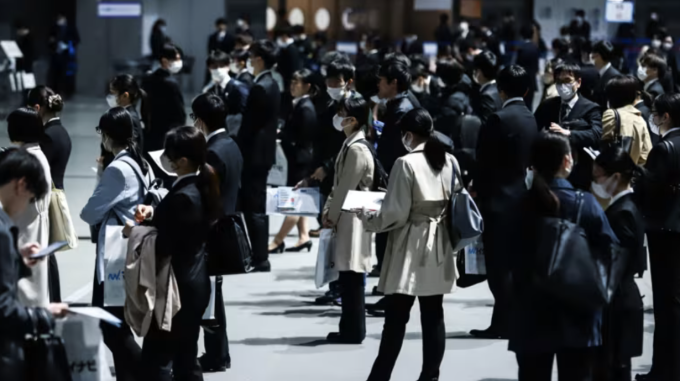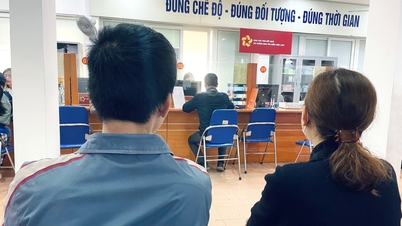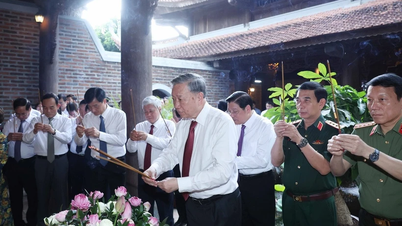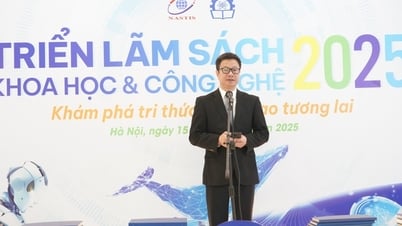Instead of trying to find a job for life, young Japanese people choose a workplace based on their interests and needs.
In mid-March, about 100 companies set up booths for a job information fair in Tokyo, Japan. To attract the attention of new graduates, companies put up colorful banners: "Over 120 paid vacation days, two days off per week," "Implementing diverse working methods," "Listing on the Tokyo Prime Stock Exchange."
A third-year university student dressed in simple black - the typical uniform of young job hunters - said he was looking for a job that would suit his love of watching musicals.
"My parents are both working and seem very dedicated to their jobs. But I would rather work for a company that offers reasonable breaks," he said.

Japanese companies attend a job fair in Saitama Prefecture in March 2024. Photo: Yuki Kohara
A recruiter at a major retailer said he wanted to recruit 120 new graduates by 2025, but there was no way to meet the target. There are more jobs than students these days. In addition, many workers care about being able to take holidays and have a steady income, forcing companies to ensure they provide a pleasant working environment that allows for a good work-life balance.
Yosuke Hasegawa, a researcher at Mynavi Career Research Lab, said that companies’ attitudes toward hiring are changing. Previously, companies were allowed to choose employees, but now students are choosing companies, and the imbalance in the relationship is weakening.
"Many companies now pay attention to listening to candidates' wishes," said Yosuke Hasegawa.
According to the Labor Ministry, Japan's birthrate fell for eight consecutive years in 2023. Estimates from the Recruit Works Institute show the country could be short of 3.4 million workers by 2030 and 11 million by 2040.

Japanese university students are becoming more selective in their job searches than previous generations. Photo: Yuki Kohara
A March survey by Mynavi also found that “good benefits,” including salary and vacation provisions, were the most important factor when 1,200 graduating students considered where to work. “Company culture” was second, with “stability” coming in third.
Japan’s intensive hiring process operates on the premise that male employees in their 20s to 60s are the core workforce, a group that can prioritize work over life, while women are expected to do housework and childcare. But as their numbers decline, it is necessary to allow more diverse backgrounds to enter the labor market, said Hisashi Yamada, an economist at the Japan Research Institute.
The number of male-only working households in 2022 was half what it was in 1985, while the number of dual-income households increased 1.7 times over the same period, according to data from the Cabinet Office. The proportion of male private sector workers taking paternity leave was 14% in 2021, up from 0.5% in 2004, although it remains low by global standards.

New recruits at Japanese airline ANA gather for an entrance ceremony in early April 2024. Photo: Sae Kamae
Kaoru Fujii, head of human resources at Recruit Co, said the Covid-19 pandemic has prompted a change in workers’ mindsets. Many are starting to reconsider their careers and redesign their lifestyles to pursue happiness, focusing on what they want.
Japan's traditional work culture, which includes overtime, after-hours drinking, and company events on weekends, was once considered a way to bond employees. But the "pathologies" of this system are becoming more apparent over time. In 2015, a 24-year-old female employee committed suicide after working overtime and being harassed by her boss at an advertising company. The term "Karoshi" has also gained attention, meaning death from overwork.
In 2019, Japan passed landmark legislation that capped overtime and required workers to take at least five paid days off each year. The pandemic has also shortened work hours. In 2022, a full-time worker in the country worked about 162 hours a month, according to the labor ministry, five hours fewer than in 2018.
But the change has had side effects. Yamada said shorter working hours meant less time to train younger employees.
Professor Miyamoto said the growing trend of job-hopping makes it difficult to train employees.
"When people are free to change jobs, companies lose the incentive to train employees. Workers are forced to improve their skills themselves and policies need to support that," the expert said.
According to the Japanese Bureau of Statistics, in 2023 alone, 3.3 million workers nationwide changed jobs, nearly reaching a record high in 2019 when nearly 10 million people wanted to change jobs.
Noriaki Yamamoto, chief executive of job-hunting platform Bizreach, said companies are becoming more accepting of job-hopping employees and individuals are no longer feeling guilty about building their careers independently.
Minh Phuong (According to Nikkei )
Source



![[Photo] Prime Ministers of Vietnam and Thailand visit the Exhibition of traditional handicraft products](https://vphoto.vietnam.vn/thumb/1200x675/vietnam/resource/IMAGE/2025/5/15/6cfcd1c23b3e4a238b7fcf93c91a65dd)
![[Photo] National Assembly Chairman Tran Thanh Man meets with Thai Prime Minister Paetongtarn Shinawatra](https://vphoto.vietnam.vn/thumb/1200x675/vietnam/resource/IMAGE/2025/5/15/e71160b1572a457395f2816d84a18b45)





























































































Comment (0)